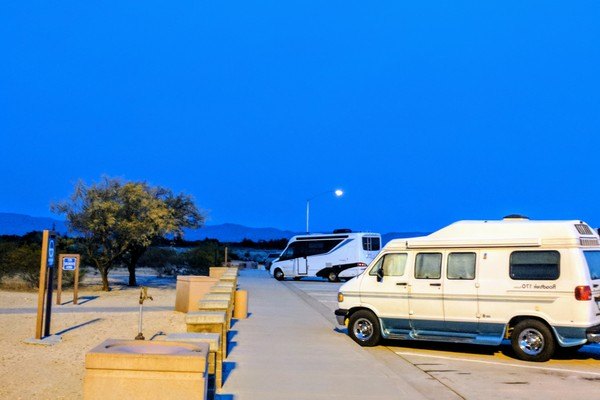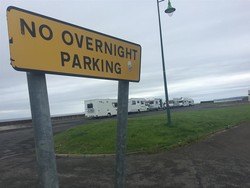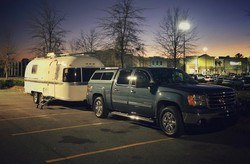
Sleeping at Rest Areas: Can RVs Park Overnight at Rest Stops?
It was 1956 when the first rest safety areas were opened in America. They were not elaborate, well lit, and were often the focal point of many horror movies that produced a lot of nightmares. The good news is that since that beginning, states have taken the pains to upgrade their rest stops so they are safer and cleaner.
Can RVs park overnight at rest stops? This will depend on the state that you are traveling through. Even though the rest stops are mainly on federal interstates, the individual state is responsible for their upkeep, rules, and enforcement of those rules.
Doing good research will help you avoid embarrassing situations.
To learn more about whether RVs can park overnight at rest stops throughout the country, just continue to read our article. It has the information you want to know about as well as links to the different states’ rules.
Can You Sleep at Rest Stops?

The answer to this question will also apply to many of the other sections in this article. We will provide a comprehensive table in a few sections from now so you can do a quick check on which states allow sleeping and so on.
Every state has the freedom to make its own rules so the answer will be yes and no. You will have to do some research on the issue as there is a gray area that influences the authorities on whether to ask you to move on or let you remain for the night.
The gray area is the boundary between the safety issue of sleeping all night in a rest area and keep tired drivers off the road. The rest areas were designed for the latter but many people found these spots convenient and a way to save on hotel or campground costs.
So you will see people in RVs, and big trucks, stopping at rest areas and spending the night. The semi-truck drivers have to comply with federal driving laws so they opt to use the rest area because it is easier to maneuver their rig. Many motel and hotels do not have parking lots that will accommodate those rigs.
These are examples of why there is what may seem a lack of enforcement of the rules.
Is it Illegal to Sleep in Your Car at a Rest Stop?
This is only illegal if the state has created and implemented a law stating that it is illegal to sleep in your car at a rest stop. Many cities have such rules, possibly counties and states as well. They also have rules on where you can and can’t sleep in your car.
One state makes it illegal to sleep in your car even when it is on private property. That means you have to check the laws of those states you hope to visit when driving your car or RV.
When it comes to rest stops, some states have time limits on how long you can spend there and those time limits prohibit sleeping. They have caretakers help you record your arrival time and they may ask you to move on when your time is over.
You may take short naps but those states that say no overnight parking are telling you that you cannot sleep in your car at their rest stops. Just be careful what other internet bloggers say on this issue as they are not the final word on the issue.
What Does no Overnight Parking Mean?

One of the problems that come with this phraseology is that it can be seen as very vague. People interpret the meaning differently and that is the source of many of their problems.
One group of people may think that that wording means that the car cannot stay all night in one spot. It is okay to park for a 5 to 20-minute errand and then they can drive off. However, this group of people has found out the hard way that may not be the case.
Another group takes that wording to mean that you cannot park in those spots at any time during the night. Whether you are there for 5 minutes or an hour doesn’t matter. The sign states that you cannot park there during any overnight hour.
The third group of people who interpret those signs, and whose interpretation really matters, are the authorities. What they have been instructed to do will be the prevailing interpretation. It will be up to the policeman’s good nature if you get to park your car in that spot at all.
What you have to be careful about are towing companies. Some can be quite aggressive and hook up your vehicle and tow it away as soon as they see it. They have a sort of no tolerance attitude towards those people who park in those zones.
Are Rest Stops Safe to Sleep at?
The best thing that can be said is they can be. 99% of the time rest stops are one of the safest places to stop at and get a little sleep. However, there is that 1% chance that you picked the wrong night to sleep there.
Rest stops are often patrolled by state troopers, have other RVs and cars there but state troopers are not usually there 24 7, nor are the other RVs and cars. So you are taking a bit of a risk when you decide to sleep at a rest stop.
If you are a single woman it is best to go find a good hotel in a safe neighborhood and spend the money for a room. Even some of the safest places to be are not always safe for single women or unaccompanied ladies.
Right now only about 14 states allow overnight sleeping so this is not going to be an issue for 36 states. Make sure you understand the difference between sleeping overnight and taking a short nap. As the latter is usually okay.
Overnight RV Parking at Rest Areas

Usually, every rest stop has a sign stating that no overnight parking is allowed. But that restriction often interferes with the stated allowed periods you are allowed to stay in a rest stop. Some states have an extended amount of time which if you arrive at the right moment, can last all night.
This is the gray area raising its head again as those periods state you can stay 6, 8, and even 12 hours in a given 24 hour period. What that translates into is that if you arrive at midnight, you can stay till 6 a.m., 8 a.m., or noon depending on the state you are in.
The other aspect about overnight RV parking is that all state officials would rather see you violate their rest stop rules than have you driving on the roads when you are tired and can’t keep your eyes open.
This is the main factor why you see so many RVers parking for the night at rest stops that do not allow it. They are simply too tired to continue. If they do and they cause an accident, well you know the rest.
What States Allow Sleeping in Rest Areas?
This is the section where you will find the quick comparison chart giving you a brief and fast look at the regulations of different states. A link to those state’s rules is also included so you can read them all BEFORE you travel to the state.
Keep in mind that the rules of one state DO NOT apply in any other state. Many people forget that fact. Also, make sure to park in the right spots for RVs.
| State | Camping | Overnight Sleep | Stay limit | Links to rules |
| Alabama | No | No | None | http://www.dot.state.al.us/ |
| Alaska** | Yes | Yes | Not Stated | http://www.dot.state.ak.us/ |
| Arizona | No | Yes | None | https://www.azdot.gov/ |
| Arkansas | No | Yes (for safety reasons only) | None | http://www.arkansashighways.com/ |
| California | No | No | 8 hours | http://www.dot.ca.gov/ |
| Colorado | No | No | None | http://www.dot.ca.gov/ |
| Connecticut | No | No | None | http://www.ct.gov/dot/site/default.asp |
| Delaware | No | No | 4 hours | http://www.deldot.gov/ |
| Florida | No | No | 3 hours | http://www.fdot.gov/ |
| Georgia | No | No | None | http://www.dot.ga.gov/ |
| Idaho | No | No | 10 hours | https://itd.idaho.gov/ |
| Illinois | No | No | 3 hours | http://www.idot.illinois.gov/ |
| Indiana | No | No | None | http://www.in.gov/indot/ |
| Iowa | No | yes (extenuating circumstances only and only 1 night) | None | http://www.iowadot.gov/index.html#/services |
| Kansas | No | One night | One night | http://www.ksdot.org/ |
| Kentucky | No | No | 4 hours | http://transportation.ky.gov/Pages/default.aspx |
| Louisiana | No | No | None | http://wwwsp.dotd.la.gov/Pages/default.aspx |
| Maine | No | No | None | http://wwwsp.dotd.la.gov/Pages/default.aspx |
| Maryland | No | No | 3 hours | http://wwwsp.dotd.la.gov/Pages/default.aspx |
| Massachusetts | No | No | None | http://www.massdot.state.ma.us/ |
| Michigan | No | No | 4 hours | https://www.michigan.gov/mdot/ |
| Minnesota | No | No | 4 hours | http://www.dot.state.mn.us/ |
| Mississippi | No | Yes | None stated | http://mdot.ms.gov/portal/home.aspx |
| Missouri | No | Yes | None stated | http://www.modot.org/ |
| Montana | No | Yes | None stated | https://www.mdt.mt.gov/ |
| Nebraska | No | No (Gray area) | 10 hours | https://dot.nebraska.gov/ |
| Nevada | Yes | Yes | 24 hours | https://www.nevadadot.com/ |
| New Hampshire | No | No | 4 hours (emergencies exempted) | https://www.nh.gov/dot/ |
| New Jersey | No | Limited | None | https://www.state.nj.us/transportation/ |
| New Mexico | No | Yes | 24 hours | http://dot.state.nm.us/content/nmdot/en.html |
| New York | No | No | 3 hours with one extra for rest stops on Thruway | https://www.dot.ny.gov/index |
| North Carolina | No | No | 4 hours | https://www.ncdot.gov/ |
| North Dakota | No | Yes | Not stated | http://www.dot.nd.gov/ |
| Ohio | No | No | 3 hours (RVs can stay overnight on the Turnpike) | http://www.dot.state.oh.us/pages/home.aspx |
| Oklahoma | No | Yes | Not stated | https://ok.gov/odot/ |
| Oregon | No | Yes | 12 hours | https://www.oregon.gov/ODOT/pages/index.aspx |
| Pennsylvania | No | No | 2 hours (unless otherwise posted) | http://www.penndot.gov/Pages/default.aspx |
| Rhode Island | No | Yes | Not stated | http://www.dot.ri.gov/ |
| South Carolina | No | No | None | https://www.dot.state.sc.us/ |
| South Dakota | No | No | 4 hours | http://www.sddot.com/ |
| Tennessee | No | No | 2 hours | https://www.tn.gov/tdot |
| Texas | No | Yes | 24 hours | https://www.txdot.gov/ |
| Utah | NO | Yes (extended stays allowed and are monitored by on site staff and Highway patrol) | Check their rules or with their staff | https://www.udot.utah.gov/main/f?p=100:6:0::::V,T:,1 |
| Vermont | No | No | None | http://vtrans.vermont.gov/ |
| Virginia | No | No | None | http://virginiadot.org/ |
| Washington | No | Yes | 8 hours | http://www.wsdot.wa.gov/ |
| West Virginia | No | Yes | Not Stated | http://www.transportation.wv.gov/ |
| Wisconsin | No | No | None | https://wisconsindot.gov/Pages/home.aspx |
| Wyoming | No | See rules | See rules | http://www.dot.state.wy.us/home.html |
** Alaska has rest stops but they have not created any rules about their use. We suggest you contact the DOT of that state to verify and find out if there are any rules or not.
*** Hawaii was left off for obvious reasons. If you find a way to drive there, let us know. The state does have a DOT and if you want to fly there and rent an RV, we suggest you contact them to see what rules apply and if there are rest stops in that state.
Rest Area Rules on Interstates

The basic rules are generally the same. Except for overnight camping, every state prohibits camping, sleeping in a tent, or outside of your vehicle. If you do stay the night make sure to leave your awnings retracted, lawn chairs stashed and the bbq grill stored.
You would have to check with each individual state as to the rules of each interstate rest stop under their jurisdiction. It is impossible to place them all here as there will be differences in all the rules. There is no one-size-fits-all here.
Check with the state DOT you are traveling to get all their locations. Most DOTs have a map on the internet for you to look at.
If you lost something, use the links in the chart above to contact the DOT office in the state where your wallet, etc., may have been lost or stolen. This also applies to those RVers who want to send a shout-out to staff or maintenance or caretakers of those rest stops.
While it is nice to hear praise for these hard workers, the people who really need to hear that praise are their bosses at the DOT.
How Long Can You Stay at a Rest Area?

That will depend on the state you are traveling through. Each one has its own time limit and almost all of them ban overnight stays, with some exceptions. If you have an emergency, exceptions will be made but that is up to the governing authorities.
Also, during our research, we came across a mention of overlooks and scenic views. You would have to check with the DOTs of each state you are visiting to see what rules apply to those attractions and picnic spots.
Some will have signs posted but if they are not there, they may have been vandalized so do not think the rules do not apply. It is always best to ask first instead of assuming, that way you will avoid embarrassing moments and maybe a fine.
There will always be exceptions to the rule, just do not abuse them or misapply them as that will ruin it for the next person. The same goes for the kindhearted state trooper who bent the rules for you.
Be respectful of the rules and people in charge as the person you hurt is your fellow traveler or RVer who arrives after you leave. That may be you at one point.
Tips for Camping at Rest Stops
- 1. Do your research - Not only to find a convenient place to stop but for the rules governing rest stops. There are plenty of websites that provide rest stop information so take advantage of that data and make sure you know what is expected of you.
Some of those websites and databases may charge a fee for access. That fee is well worth the money if the information keeps you out of trouble and helps you find some great places to spend the night for free.
- 2. Do not camp - As you see by our chart, no camping is allowed. Camping usually refers to pitching a tent, building a fire, and unrolling your sleeping bags. Some states make a point to clearly state you cannot sleep outside of your vehicle.
However, many rest stops provide picnic areas for lunch and some even have bbq grills. That activity is not camping
- 3. Read all the signs - While some states do have an overnight parking allowance, this is not a uniform policy with all rest stops in the same state. Make sure you can stop for the night before settling in.
The signs at each rest stop will provide the information you need to know for that particular spot.
- 4. Stay safe - This is the most important part of sleeping at a rest stop. If you do not feel safe, then leave; if you see some criminal activity going on, leave; if the rest stop is not well lit, you are by yourself, then you should leave. A good truck stop etc. may be down the road a few miles where you will be safer.
- 5. Don’t camp by yourself - This applies to both men and women as a solo camper, even in an RV is a very vulnerable target. Travel with a companion, spouse or go to hotels instead.
Or travel with a good guard dog or at least one that barks when strangers approach your vehicle.
- 6. If you are not afraid - you may want to consider carrying a gun with you. That option is solely up to you and we won't say much more on this topic. Except to say, make sure you know how to use it correctly.
Advantages of Sleeping at a Rest Stop
Some of these advantages will apply to hotels, motels, and campgrounds as well as staying a night at a rest stop.
- 1. You save money - a free night is always a good advantage. You can use the money you save for other purposes
- 2. You save time - trying to find motels, etc., in the dark and in a strange city can be difficult. Plus, RVs can be hard to maneuver through city streets. rest stops are convenient and they are easy to access, as long as all the RV spots are not taken by the time you get there.
- 3. Gives you a short - term break- that may be all you will need to continue to your destination. A short nap can’t be done in a hotel room, etc., but it can be done at a rest stop. It is also encouraged so you stay alert while you are driving.
- 4. You get some snacks - Driving can make a person hungry and thirsty. You can use the drinking fountain found at many rest stops or you can buy some snacks and a drink or two at the vending machines. However, not all rest areas have vending machines.
- 5. You can have lunch or supper - Instead of hunting for a restaurant or going to a fast food place for the 10th time on your trip, many rest stops have picnic areas where you can have either a hot or cold lunch.
They usually have picnic tables, grills, or some other picnic option so you can take a break, stretch your legs and eat all at the same time. You will save money as well by not going to a restaurant, etc.
- 6. You can see nature - not all rest stops allow this but some are connected to hiking trails, give you river access or let you have a grand view of the area. Take advantage of those rest stops that due and soak in the beauty of the country
Some Final Words
Knowing what you can or cannot do at rest stops around the country will enhance your vacation or exploration. Just do some good research and check out all the rules before you arrive at the rest stop you want to spend the night at.
Not every state is friendly to those who want to spend a night at their rest stops.

